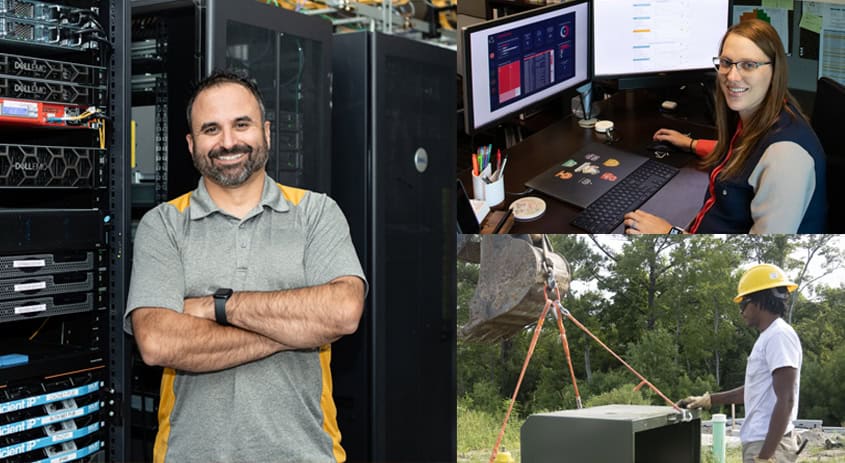Energy careers are uniquely stable and innovative
The electricity in your home may seem like an impossible miracle to explain. But one way to understand it is to think about the variety of skills and job roles it takes to make that power happen. Running electric utilities takes just about every skill imaginable. Some jobs call for the physical ability to climb a utility pole, while other roles require the technical know-how to create intricate cybersecurity systems. Some need the interpersonal skills of talking with co-op members about how they can lower their electric bill, while others call for the logistical knowledge to get essential equipment delivered through a challenging supply chain. An industry that depends on such a vast range of abilities offers job seekers a variety of career opportunities. This year, Careers in Energy Week is October 16–20. To highlight this industry and the many career paths it offers, here are five ways the unique characteristics of electric co-ops make them a great place to work:
Stability
You can count on homes and businesses needing electricity now and in the future. One analysis predicts electricity demand will grow even faster in the 2020s than it has the previous two decades. Energy careers offer excellent benefits, paths for career advancement, and the opportunity for longevity — electric co-op employees typically stay in the industry more than 15 years.
Excitement
While utility work is dependable, it’s also at the cutting edge of innovation. The number of electric vehicles on the road increases each year, which means new workforce skills are needed to figure out how to keep all those cars and trucks plugged in and charged. Renewable energy is on the rise, too. According to the U.S. Bureau of Labor Statistics, two of the 20 fastest-growing occupations are wind turbine technician and solar voltaic installer. The energy industry is changing, and it’s an exciting time to be part of it.
Variety
The skills and education needed in the utility industry are varied. Positions may require advanced college degrees, trade school certificates, apprenticeships, or on-the-job training. And the range of positions is staggering — accountants, social media managers, IT specialists, engineers, and human resources professionals, just to name a few. Other positions include drone operators who inspect power lines; data analysts who coordinate the flow of electricity; and power plant operators who oversee electricity generation.
It’s local
The thing about electricity is that maintaining the service needs to happen nearby. That means that much of the work takes place near your hometown. Not only can a utility worker make a living and raise a family in the place they choose to live, if they decide to move to another part of the country, there will likely be energy career opportunities there as well.
Satisfaction
Any lineworker will tell you even when they’ve just climbed down from a pole in the middle of the night during a rainstorm, there’s no better feeling than knowing the power outage you’ve just restored brought light and heat back into the homes of hundreds of people. The same goes for the utility truck dispatcher back at headquarters and the media specialist getting the word out about the status of power restoration. Equally important are the system resilience planners working to avoid an outage in the first place and the engineers creating an energy system for the future with renewable energy technologies and utility-scale batteries. Utility workers know they’re powering their neighbors and the nation. The people behind the power at your electric co-op get to know even higher levels of job satisfaction and find purpose in their work. Electric co-ops offer a unique business model led by the members who use the electricity. It’s a form of business with a commitment to improving the quality of life for the local community.
Paul Wesslund writes about consumer and cooperative affairs for he National Rural Electric Cooperative Association, the national trade association representing more than 900 local electric cooperatives.










